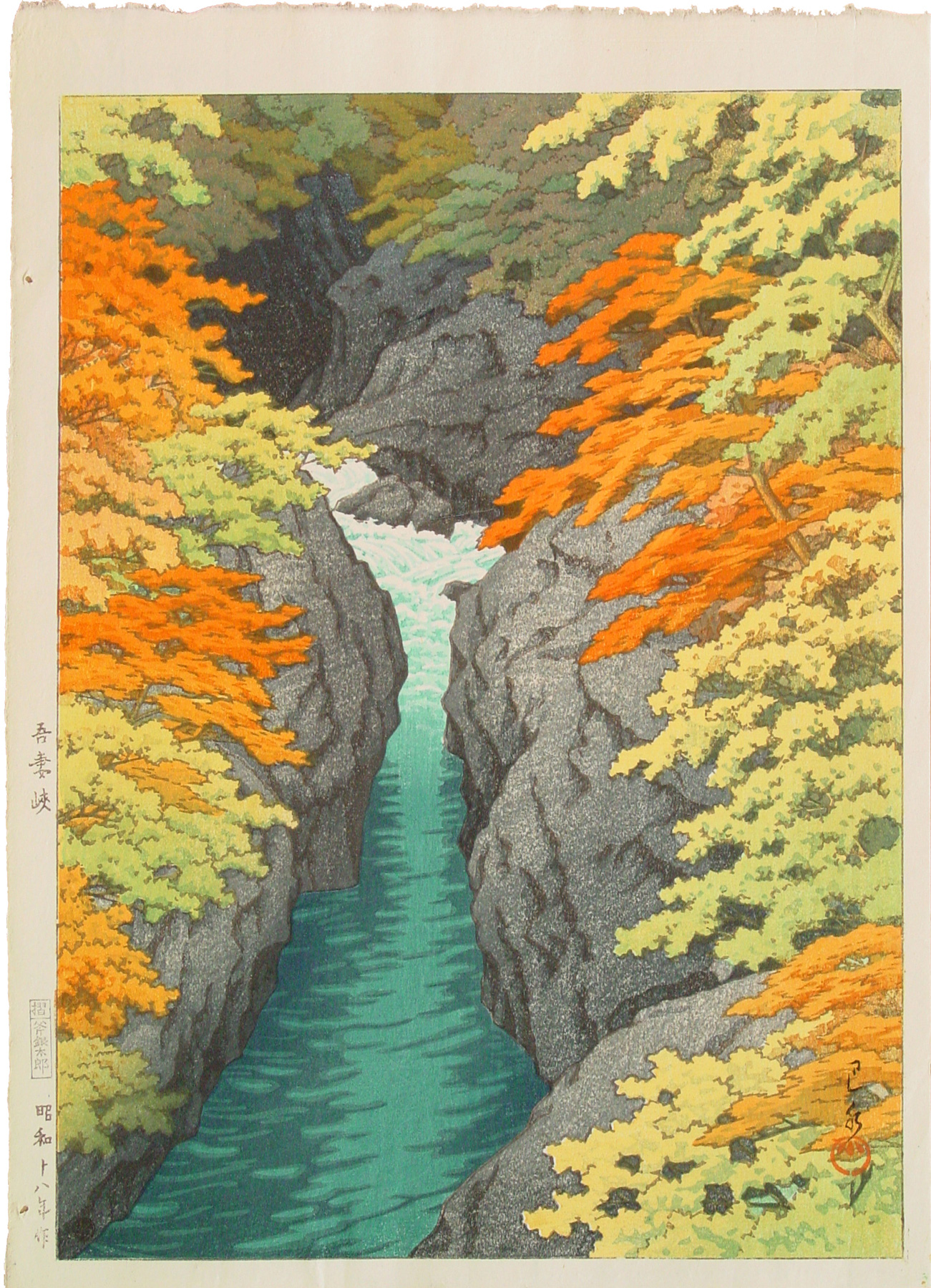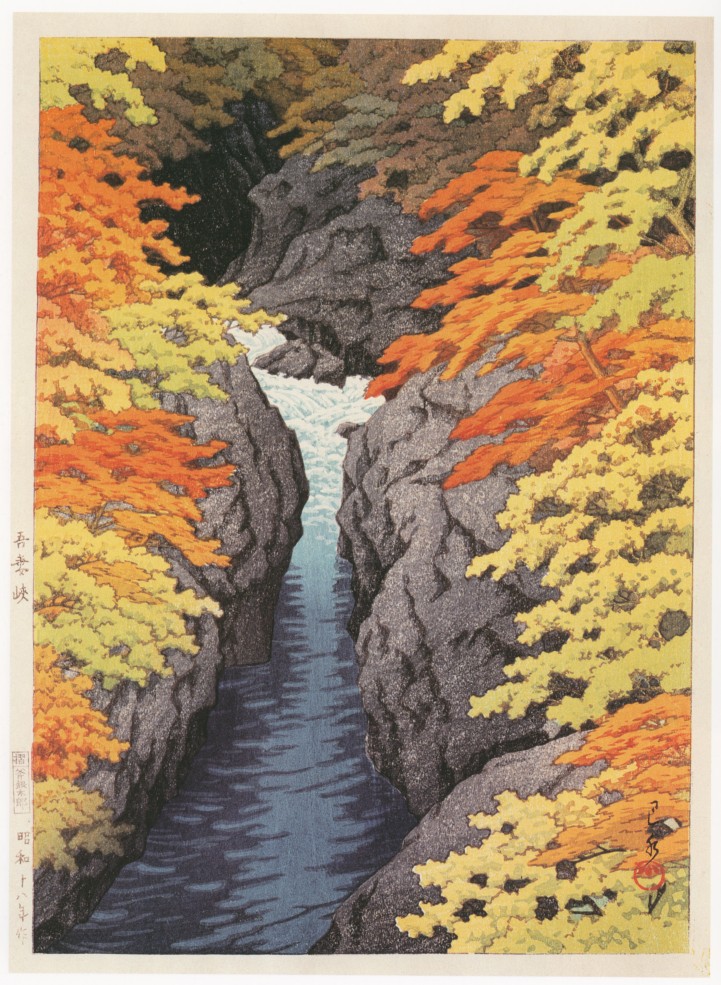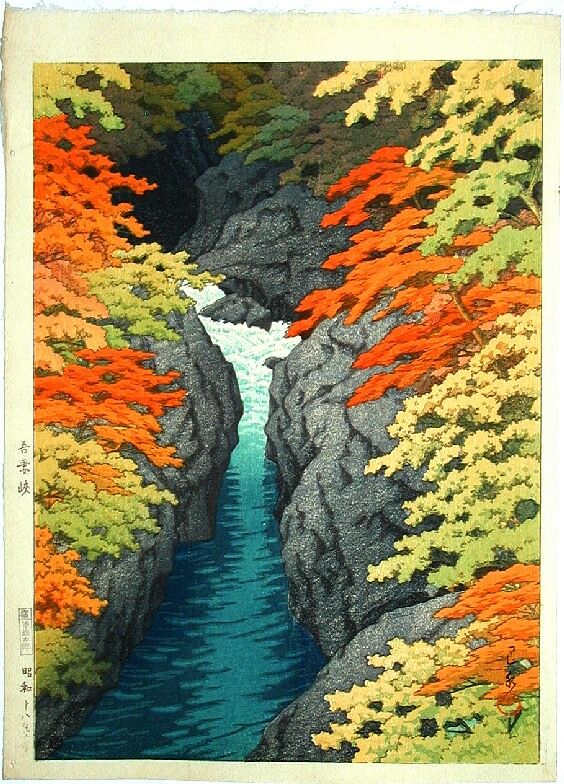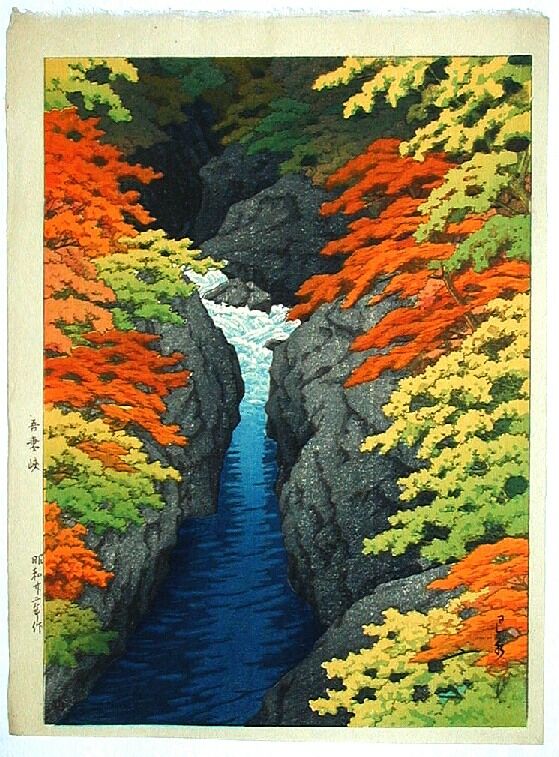About This Print
While titled Azuma Gorge, this print may well be of Agatsuma Gorge as explained in the section"The Image - Azuma Gorge or Agatsuma Gorge?" at the bottom of this page.
Catalog Raisonné Entry
Source: Kawase Hasui; The Complete WoodblockPrints, Kendall Brown, Amy Reigle Newland, Amsterdam, Hotei Publishing, KIT Publishers, 2003, p. 118.| Catalogue Raisonné image and entry 470 Azuma Gorge (Azuma kyo) Work of 1943 Hasui signature with Kawase Seal Publisher: Watanabe Shozaburo Printer: Ono Gintaro (unsealed) Azuma gorge is on the way to Kusatsu hot spring in Gunma prefecture. |
Hasui's "Azuma Gorge" - One Print - Two Dates of Origin?
The following is copied from Thomas A. Crossland's website Ukiyoe-Gallery
Usuallya woodblock print carries the date of its creation in its margin,giving us clear proof when the print was designed or the blocks gotcarved. However, surprisingly we have found an example where one andthe same print exists in two versions with different dates, in our case"Showa 18" (1943) and "Showa 22" (1947), separated at least by a timespan of four years.
The print is by Kawase Hasui and shows the beautiful autumn landscape of the Azuma Gorge, deep blue running water, framed by yellow and red autumn leaves. Narazaki as well as Merritt & Yamada both date this print back into 1943 (Showa 18).
"In 1943, S. WATANABE CO. finished the test printings (only a few copies) for this design. As you know, in 1943, toward the end of the World War II, S. WATANABE CO. lacked for the paper and all the materials for printings. In addition, printers had to go to War. So we could not do it at all."
"We could make printings of this in 1947 at last, 2 years after WWII. So there are two types of the date (1943 and 1947). Therefore, the prints dated 1943 is quite few."
"Although our new "atozuri" (posthumous printing from original blocks) print is dated "Showa 22 nen" (1947), we do say this is dated 1943 the same as in the "Complete (Hasui) Catalogue" by Hotei."
Sincerely,
Shoichiro Watanabe
S.WATANABE COLOR PRINT CO.
A print with the Gintaro seal is eligible to, and typically should, also carry a 6 mm. (Of course there are exceptions.) Some examples depicted in Narazaki with both seals are: N382, N414, N473, N474, N476, N489 to N496, and N498. A number of other prints (including this print) are shown with the Gintaro seal but the image does not clearly reveal a 6 mm -- it might or might not be there.
Some background is useful to know. Gintaro apparently ran the Watanabe shop around the war years, when prints carry his seal. But he would have still been required generally to use Watanabe's 6 mm copyright seal, reintroduced at that time.
last revision:
| 1943 version | 1947 version |
The print is by Kawase Hasui and shows the beautiful autumn landscape of the Azuma Gorge, deep blue running water, framed by yellow and red autumn leaves. Narazaki as well as Merritt & Yamada both date this print back into 1943 (Showa 18).
Surprisingly the very same print exists in a "later" version (right image). Now it is dated "Showa nijuni nen saku" -- "Made in Showa 22" (1947). The printer seal is not present, only the 6mm round seal gives evidence of the Watanabe publishing house.
An Explanation from Shoichiro Watanabe
"Azuma Gorge is located in Saitama Prefecture and is very small. Agatsuma Gorge is located in Gunma Prefecture(north of Saitama Pref.) and is very big. Hasui had traveled to Agatsuma but not to Azuma. (The note of the "Complete (Hasui) Catalogue" by Hotei Publishing is wrong.)"
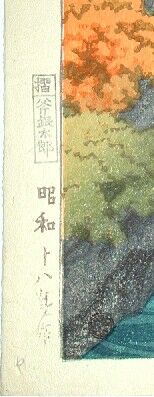 | 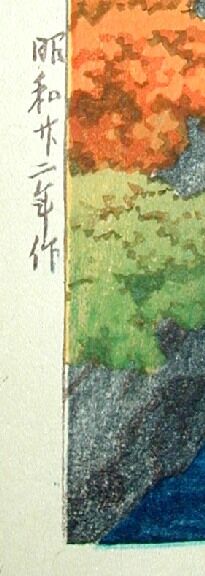 | The earlier edition (left image) is dated "Showa juhachinen saku" --"Made in Showa 18" (1943). In addition, a boxed seal of the printer"Suri" Ono Gintaro, one of Watanabe's master printer is stamped ontothe margin, furthermore, a round black 6mm Watanabe seal is in thelower left corner within the imprinted area. It is known that Ono'sprinter seal (known as an "I seal") was in use during and shortly afterthe War instead of a Watanabe publisher's seal. The round black 6mm Watanabe seals in the left lower part of both prints are hardly visible against their dark backgrounds. It is not clear whether for both editions an identical set of blockswas used. The missing of fine strong lines, slightly different coloringschemes makes an exact and reliable comparison very difficult. However,at least we can say that the keyblock and probably some others were thesame. |
 |  | In both cases the keyblock shows a slight damages, e.g., here at theleft margin a part of approx. 2mm is missing, an indication that thekeyblock for the Showa 18 and Showa 22 edition is the same except forthe writing. |
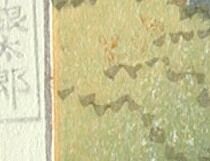 | 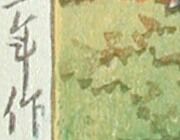 | The fine details, printed in grey / green seem to be identical, althoughthe block of the Showa 22 edition shows some wear already. The "registration" of the blocks is poor in both cases. |
An Explanation from Shoichiro Watanabe
Shoichiro Watanabe, the grandson of Shozaburo Watanabe and owner of S. Watanabe Color Print Co., provided the following explanation via email on why there are two differently "margin-dated" states
(1943 and 1947) for this print.
"In 1943, S. WATANABE CO. finished the test printings (only a few copies) for this design. As you know, in 1943, toward the end of the World War II, S. WATANABE CO. lacked for the paper and all the materials for printings. In addition, printers had to go to War. So we could not do it at all."
"We could make printings of this in 1947 at last, 2 years after WWII. So there are two types of the date (1943 and 1947). Therefore, the prints dated 1943 is quite few."
"Although our new "atozuri" (posthumous printing from original blocks) print is dated "Showa 22 nen" (1947), we do say this is dated 1943 the same as in the "Complete (Hasui) Catalogue" by Hotei."
Sincerely,
Shoichiro Watanabe
S.WATANABE COLOR PRINT CO.
Ono Gintaro Printer Seal
Source: Chris Johannesen of shinhanga.netA print with the Gintaro seal is eligible to, and typically should, also carry a 6 mm. (Of course there are exceptions.) Some examples depicted in Narazaki with both seals are: N382, N414, N473, N474, N476, N489 to N496, and N498. A number of other prints (including this print) are shown with the Gintaro seal but the image does not clearly reveal a 6 mm -- it might or might not be there.
Some background is useful to know. Gintaro apparently ran the Watanabe shop around the war years, when prints carry his seal. But he would have still been required generally to use Watanabe's 6 mm copyright seal, reintroduced at that time.
The Image - Azuma Gorge or Agatsuma Gorge?
According to Shoichiro Watanabe, "Azuma Gorge is located in Saitama Prefecture and is very small.Agatsuma Gorge is located in Gunma Prefecture (north of Saitama Pref.)and is very big. Hasui had traveled to Agatsuma but not to Azuma. (Thenote of the "Complete (Hasui) Catalogue" by Hotei Publishing iswrong.)"Print Details
| IHL Catalog | #69 |
| Title | Azuma Gorge 吾妻峡 Azuma kyō |
| Series | |
| Artist | Kawase Hasui (1883-1957) |
| Signature |  |
| Seal | Kawase seal (see above) |
| Publication Date | 1943 昭和十八年 |
| Edition | Likelyfirstedition with publishers 6mm round "A"-type seal printed, and barelyvisible, in lower left corner. Print also has the seal of the printerOno Gintarō in the lower left margin. (For a full discussion ofWatanabe publisher sealssee "Watanabe Publisher Marks, Seals and Editions") |
| Publisher |  Watanabe "A"-type seal (in use from approximately 1918-1924 and 1945-1957) appearing in lower left corner of image reading (in Katakana): ワタナベ Watanabe Shōzaburō |
| Printer |  摺 斧銀太郎 suri Ono Gintarō in lower left margin |
| Impression | excellent |
| Colors | excellent |
| Condition | excellent - 2 pin holes left margin, pencil notation verso bottom margin "Adzuma Valley in Gumma Pref. By Hasui" |
| Miscellaneous | Print is actually of Agatsuma Gorge not Azuma Gorge according to Shōichirō Watanabe, grandson of Shōzaburō Watanabe. |
| Genre | shin hanga (new prints) |
| Format | ōban tate-e |
| H x W Paper | 14 1/2 x 10 3/8 in. (35.6 x 26.4 cm) |
| H x W Image | 13 1/8 x 9 1/2 in. (33.3 x 23.8 cm) |
| Collections This Print | Cleveland Art Museum 2005.479 (6mm round Watanabe publisher sealvisible lower left of image) ; Los Angeles County Museum of Modern ArtM.2003.67.48 (unspecifiededition and no seals can be discerned on thumbnail image of print);Museum of Fine Arts,Boston 50.2853 (The following is noted in the entry: "The impressionillustrated in Brown is dated 1943 (Shōwa 18), whereasthis one is dated 1947 (Shōwa 22) and lacks the publisher's mark; butotherwise the blocks appear to be identical."); The National Museum ofModern Art, Tokyo P00138-117(unspecifiededition with no visible publisher's seal, but the printer seal ofprinter Ono Gintarō is visible in lower left margin.); Honolulu Museum of Art Source Id 11121; Virginia Museum of Fine Arts 2006.468 |
| Reference Literature | CatalogueRaisonné: Kawase Hasui; TheComplete Woodblock Prints, Kendall Brown, Amy Reigle Newland, Hotei Publishing, KITPublishers, 2003, ISBN: 9074822460, - pg. 528, pl. 470 Kawase Hasui and His Contemporaries: The Shin Hanga (NewPrint) Movement in Landscape Art, p. 74, pl 92. Visions of Japan: Kawase Hasui's Masterpieces, Kendall H. Brown, Hotei Publishing, 2004, p. 117, pl 81 |
8/18/2021


